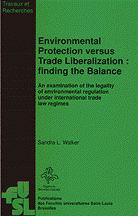Environmental Protection versus Trade Liberalization : finding the Balance
Recent years have witnessed a proliferation of laws regulating the environment. Such laws aim to protect the environment of the legislating country and increasingly, the environment beyond its borders. While the objectives of these rules appear to be laudable ones, environmental regulation is frequently criticized as trade-restrictive and protectionist. In addition, attempts to regulate foreign production processes are attacked as interfering with the sovereign right of foreign countries to determine their own standards of environmental management. Environmental protection goals may also hinder international trade and consequently become vulnerable to legal challenge under international trade law. The manner in which international trade law weights the competing objectives of environmental protection and trade liberalization is the subject of this book. The experience of the European Economic Community in this regard provides a useful backdrop against which the treatment of environmental regulation under the GATT can be both examined and improved. The author concludes the GATT reforms, such as the incorporation of environmental principes into GATT jurisprudence, are critical to ensuring the legality of legitimate environmental protection measures. Such efforts would serve to safeguard both the environment and a more stable international trading system. The study was financed by the Brussels Capital Region through the Visiting Scientist's Programme.

